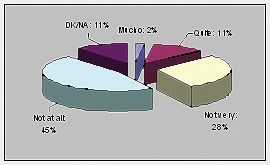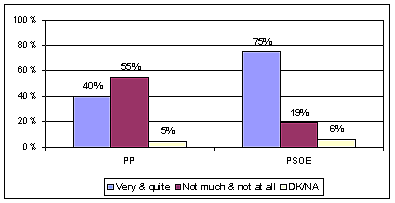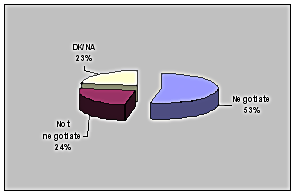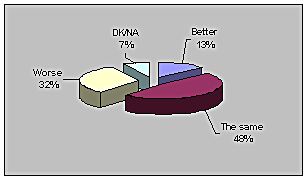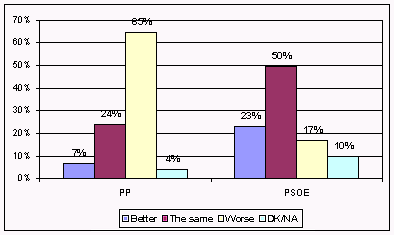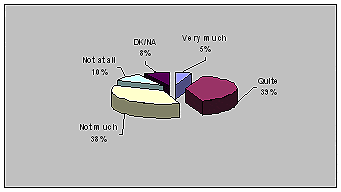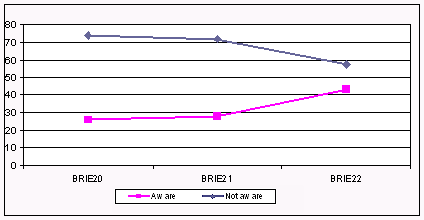TWENTY-SECOND EDITION OF THE BAROMETER OF THE ELCANO ROYAL INSTITUTE (November 2009)
Press Sumary
TECHNICAL DATA
First Wave
- Universe: general Spanish population, aged 18 and over.
- Sample size: N = 1,200 interviewees.
- Interview methodology used: telephone (interviewee called at home).
- Sample size: stratified, directly proportionate to the distribution of the national population, with proportionate quotas according to age and sex.
- Sample error: ±3% for global data (1,200n); ±4.0% for sub-samples (600n), p = q = 0.5 and a confidence interval of 95.5%.
- Survey period: from 23 October to 5 November 2009.
- Field work: Gabinete de Análisis Demoscópico (GAD).
Second Wave
- Universe: general Spanish population, aged 18 and over.
- Sample size: N = 603 interviewees.
- Interview methodology used: telephone (interviewee called at home).
- Sample size: stratified, directly proportionate to the distribution of the national population, with proportionate quotas according to age and sex.
- Sample error: ±4.0%, p = q = 0.5 and a confidence interval of 95.5%.
- Survey period: from 23 to 25 November 2009.
- Field work: Gabinete de Análisis Demoscópico (GAD).
SATISFACTION WITH THE OUTCOME OF THE ALAKRANA HIJACKING
- Most Spaniards, 60%, are satisfied with the outcome of the hijacking of the tuna-trawler Alakrana in waters off Somalia, compared with 34% who are not.
With regard to the hijacking and release of the tuna-trawler Alakrana, are you satisfied with the outcome?
Graph 1. Satisfaction at the outcome of the Alakrana hijacking
- Among people who vote for the Popular Party (PP), the proportion of those who are not very satisfied or not satisfied at all is 55%, 36 points lower than among those who support the Socialist Party (PSOE), 75% of whom say they are satisfied with the outcome.
Graph 2. Satisfaction with the outcome of the Alakrana crisis, recalling voting proportions in the general election of 2008
- In general, 53% of Spaniards believe that with this kind of hijacking the best thing to do is negotiate, and pay ransom if necessary.
- On the other hand, 24% oppose negotiating and say force should be used if necessary.
With a kidnapping of this kind, what do you think is the best thing to do?
- Negotiate and pay ransom, if necessary
- Do not negotiate, and use force if necessary
Graph 3. The best course of action in a kidnapping
- In general, the overriding idea is that the ordeal did not have a negative impact on Spain’s image. One of every two Spaniards, or 61%, think that in the wake of the hijacking and release of the Alakrana, Spain’s image is the same as or better than before. Only 32% feel the country’s image is now worse.
With the outcome of the Alakrana crisis, do you think Spain’s image is better, the same, or worse than it was before?
Graph 4. Is Spain’s image better or worse?
- Whereas 65% of supporters of the PP believe Spain’s image was harmed, for most PSOE backers it was not. A total of 23% of them even think Spain’s image was enhanced.
Graph 5. Opinion on Spain’s image abroad after the Alakrana ordeal, recalling vote in Spanish general election
- As for the threat posed by pirates in the future, now that Spanish vessels fishing in the Indian Ocean carry armed security guards aboard, opinions differ. A total of 48% think it unlikely there will be more hijackings, but 43% feel there might be.
Now that Spanish ships are going to start carrying security guards, do you think it is likely there will be more hijackings in the Indian Ocean?
Graph 6. Likelihood of more hijackings
- What all Spaniards do agree on with regard to the hijackings that are taking place is the need for the international anti-piracy mission in the Indian Ocean, known as Operation Atalanta. A total of 59% feel it should be ‘extended and strengthened’. Only 11% would do away with it.
In light of the hijackings that are taking place, what should be done with the Atalanta mission?
Graph 7. What should be done with Atalanta?
EXCELLENT ASSESSMENT OF OVERSEAS MISSIONS
- Right now, the Atalanta mission against piracy in the Indian Ocean is the one that receives the best evaluation from Spaniards: 55% have a positive opinion of it, as opposed to 30% who have a negative assessment.
What is your opinion of the presence of Spanish troops in…?
- Very positive
- Positive
- Negative
- Very negative
Graph 8. Percentage of positive and very positive evaluations
- Twenty years after Spanish military forces began taking part in overseas missions, the vast majority of Spaniards –74%– hold a very positive opinion of the role played by Spain, as opposed to only 12% who have a negative opinion.
Spain is celebrating the 29th anniversary of its troops’ first taking part in international missions abroad. How do you assess the role they have played all these years?
- Very positive
- Positive
- Negative
- Very negative
Graph 9. Role played by Spanish peacekeeping forces
CONCERN OVER AFGHANISTAN AND PAKISTAN
- As for the mission in Afghanistan, those who advocate bringing home Spain’s troops are still a minority: 41%, compared with 52% who feel the mission should continue.
Graph 10. Presence of Spanish troops in Aghanistan
- Whether or not people support sending troops on overseas missions stems from their perception of danger, which varies greatly from one assignment to another. In the case of Afghanistan 90% of those polled feel it is ‘very’ or ‘quite’ dangerous. The percentage drops to 83% for Lebanon, 73% for the Indian Ocean and 65% for Bosnia.
How much danger is involved for Spanish troops taking part in the following missions?
- A lot
- Quite a bit
- Little
- None at all
Graph 11. Percentage of interviewees who feel the mission is very or quite dangerous
- Other factors also come into play. Before the second round of the Afghan elections was cancelled, 70% of those interviewed felt that the elections were not decisive for the country’s stability.
Do you think that the new elections in Afghanistan will be decisive for stabilising the situation in that country?
- Very much so
- Rather
- Not much
- Not at all
Graph 12. Will the new Afghan elections be decisive for stabilising the country?
- The overall opinion is pessimistic: 90% feel the situation in the country is bad.
In your opinion, how is the situation now in Afghanistan?
- Very good
- Good
- Bad
- Very bad
Graph 13. The situation in Afghanistan
- The interviewees also expressed concern over the situation in Pakistan. Again, 90% think it is bad.
How do you evaluate the situation in Pakistan?
- Very good
- good
- bad
- very bad
Graph 14. The situation in Pakistan
- Seventy percent think the current offensive against the Taliban in the north of the country will not solve the country’s problems.
Do you think Pakistan’s offensive against the Taliban will manage to stabilise the country?
- Much
- Rather a lot
- Not much
- Not at all
Graph 15. Will the offensive against the Taliban help stabilise Pakistan
- Sixty-three percent feel there is a real danger of Pakistan’s nuclear weapons falling into the hands of the Taliban.
Do you think there is a danger of Pakistan’s nuclear weapons falling into the hands of the Taliban and posing a threat for its neighbours and for the West?
Graph 16. Can Pakistan’s nuclear weapons fall into the hands of the Taliban?
OBAMA’S HONEYMOON
- The vast majority of Spaniards think their country’s relations with the US are now good or very good: 71%, compared with just 3% who feel they are in a poor state. We can conclude that Spaniards now view the US as an ally, even more so than neighbouring countries such as France and Germany. This is the most important change in view ever recorded by the Barometer.
How do you assess Spain’s bilateral relations with these countries?
Graph 17. Spain’s bilateral relations
- Still, one of every two Spaniards is against taking in prisoners from Guantanamo Bay, compared with 29% who are in favour.
Do you agree or disagree with the idea of Spain taking in inmates from the prison at Guantanamo Bay?
Graph 18. Should Spain take Guantanamo prisoners?
- Obama continues to be enormously popular in Spain. He is the top-rated world leader.
Graph 19. Ratings of world leaders
- However, those who think that his having been awarded the Nobel peace prize was unfair (48%) outnumber those who think it was a correct decision (35%).
The Nobel peace prize was recently awarded to US President Barak Obama. How you do view this decision?
- Very fair
- Fair
- Unfair
- Very unfair
Graph 20. Was President Obama’s Nobel Peace Prize…?
EVALUATION OF 2009 AND EXPECTATIONS FOR 2010
- Although nearly 80% of those interviewed feel the international situation is now bad, one of every two Spaniards expect it to improve.
Looking to the future, however, optimism is the dominant sentiment: one of every two interviewees says the situation will get better.
And with regard to the future, will it improve, worsen or stay the same?
- Improve
- Worsen
- Stay the same
Graph 21. Will the situation…?
If we compare this with the latest data, we observe a trend towards greater optimism, which is probably due to the ‘Obama effect’.
Graph 22. Evolution of how the international situation is viewed, BRIEs 8 to 22
- 68% of Spaniards feel that relations with the US have improved greatly over the past year, the period that coincides with the Obama Presidency. This is the area of Spanish foreign policy in which there has been the most significant change in 2009.
Compared to 2009, do you think each of the following issues have improved or worsened?
- Spain’s influence in the EU
- Relations between Spain and the US
- Illegal immigration bound for Spain
- Relations between Spain and Morocco
- Relations between Spain and Venezuela
- The threat of international terrorism
Graph 23. Percentage of interviewees who feel the issue has improved
- As for expectations for the future, the factor expected to generate the biggest change is ratification of the Treaty of Lisbon, although, before the Czech Republic lifted its veto, one of every two Spaniards considered it unlikely the treaty would be ratified.
OPTIMISM OVER THE CRISIS
- Spaniards continue to view the international financial crisis as the biggest threat, ahead of terrorism and, trailing far behind, swine flu.
In a list of possible threats to Spanish interests, which do you see as extremely grave?
Graph 24. Percentage of interviewees that consider threat to be ‘extremely grave’
- In fact, when asked to identify the problem that worries them most out of a group of four (international terrorism, the economic crisis, Afghanistan and swine flu), the ratio between the economic crisis and international terrorism is 3 to 1.
Of the following four problems, which would you say worries you the most?
- International terrorism
- The international financial crisis
- Swine flu
- The situation in Afghanistan
Graph 25. Most worrying problem
- However, all signs are that the opinion trend with regard to the crisis is changing, since 53% of Spaniards now think the economic situation is improving, compared with just 17% who feel it is getting worse.
How would you say the international financial crisis is going: is it improving, getting worse…?
Graph 26. The financial crisis is…?
THE SPANISH EU PRESIDENCY OF 2010
- The fight against the crisis is the goal that Spaniards see as the top priority for the Spanish EU Presidency in the first six months of 2010.
Spain has proposed a series of goals for its EU Presidency in 2010. What do you think of these issues?
- Gender equality
- Strengthening relations with the US
- Addressing the financial crisis
Graph 27. Importance of issues
- Compared to the previous wave of the Barometer, the percentage of interviewees who knew that Spain will lead the EU in the first half of 2010 has gone up 20 points.
Graph 28. Evolution of awareness that Spain holds the EU Presidency in the first half of 2010, BRIEs 20 to 22
- The Spanish Presidency stirs more interest than other events in 2010, such as the British general elections or the World Cup in South Africa, even though football is hugely popular in Spain.
These events will take place in 2010: can you tell me which interests you most?
- The World Cup in South Africa
- The Spanish EU Presidency
- The Holy Year of Saint James
- The British general elections
Graph 29. Degree of interest in…?
A NEW CHANCE FOR MADRID TO STAGE THE OLYMPIC GAMES
- Fifty-five percent of Spaniards accept the decision of the International Olympic Committee and think it is alright that Rio de Janeiro was elected to host the games in 2016.
- But there is no doubt about support for Madrid’s candidacy, as 68% of those polled think the city should bid to hold the 2020 Games.
Do you think Madrid should try again and bid to hold the Olympic Games in 2020?
Graph 30. Should Madrid bid for the 2020 Olympic Games?
SCEPTICISM OVER INTERNATIONAL REACTION TO CLIMATE CHANGE
- Global warming is one of the international problems that worry Spaniards most. For 56%, it is a very serious problem.
- However, before Obama announced he would get more involved in the issue, Spaniards were wary of how much of a priority the problem was for world leaders. A total of 63% thought that at the climate change summit in Copenhagen measures to fight the problem would be put off.
A climate-change summit will soon be held. Do you think measures to address the problem will be taken immediately, or that they will be postponed?
Graph 31. Result of the climate-change summit


